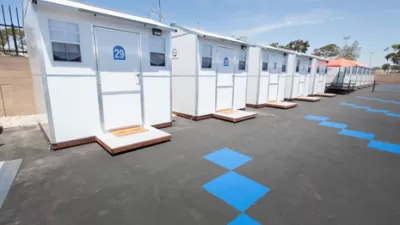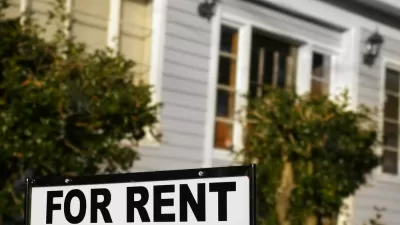An Atlanta City Councilmember and local advocates are pushing for the city to join the ranks of cities that have allowed tiny houses as a solution to housing challenges.
Max Blau examines the tiny house movement for signs of life in the South, where such buildings are still illegal.
"Aside from academic experiments, like the 135-square-foot 'SCADpads' built last year in a Midtown parking deck, developers aren’t allowed to build tiny homes inside the Atlanta city limits. Why not? The city’s code prohibits the construction of single-family homes smaller than 750 square feet. Some local governments have created restrictions on the minimum size of “dwellings” prior to the burgeoning tiny house movement. Looking elsewhere in the metro area, Gwinnett and Dekalb counties require single-family homes to be at least 1,000 square feet."
Blau reports, however, that Atlanta City Councilmember Kwanza Hall is seeking legislation that would allow tiny houses in eastside neighborhoods like Old Fourth Ward and Inman Park, which councilmember Hall represents. Councilmember points to the areas many "non-conforming lots" as ideal for tiny houses and micro-unit apartments. "He envisions a wide variety of different types of people such as college graduates, young professionals, homeless people, and empty nesters occupying the affordable homes," writes Blau.
The Atlanta City Council is expected to approve legislation next month, report Blau, that would enable planners to study code refinements that would pave the way for the new variety of housing.
FULL STORY: When will Atlanta join the tiny house movement?

Maui's Vacation Rental Debate Turns Ugly
Verbal attacks, misinformation campaigns and fistfights plague a high-stakes debate to convert thousands of vacation rentals into long-term housing.

Planetizen Federal Action Tracker
A weekly monitor of how Trump’s orders and actions are impacting planners and planning in America.

Chicago’s Ghost Rails
Just beneath the surface of the modern city lie the remnants of its expansive early 20th-century streetcar system.

Bend, Oregon Zoning Reforms Prioritize Small-Scale Housing
The city altered its zoning code to allow multi-family housing and eliminated parking mandates citywide.

Amtrak Cutting Jobs, Funding to High-Speed Rail
The agency plans to cut 10 percent of its workforce and has confirmed it will not fund new high-speed rail projects.

LA Denies Basic Services to Unhoused Residents
The city has repeatedly failed to respond to requests for trash pickup at encampment sites, and eliminated a program that provided mobile showers and toilets.
Urban Design for Planners 1: Software Tools
This six-course series explores essential urban design concepts using open source software and equips planners with the tools they need to participate fully in the urban design process.
Planning for Universal Design
Learn the tools for implementing Universal Design in planning regulations.
planning NEXT
Appalachian Highlands Housing Partners
Mpact (founded as Rail~Volution)
City of Camden Redevelopment Agency
City of Astoria
City of Portland
City of Laramie





























